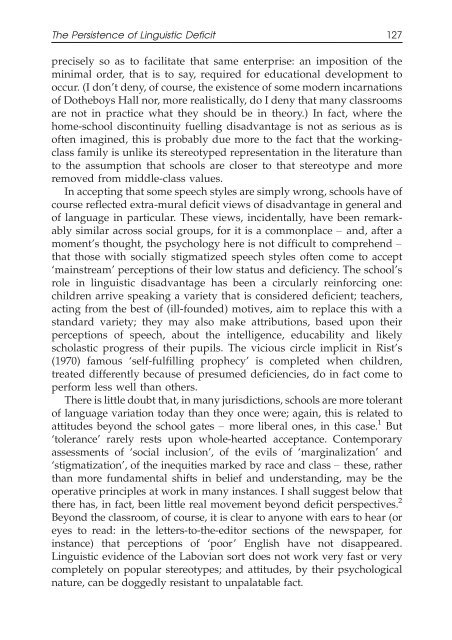Language Diversity in the Classroom - ymerleksi - home
Language Diversity in the Classroom - ymerleksi - home
Language Diversity in the Classroom - ymerleksi - home
- No tags were found...
Create successful ePaper yourself
Turn your PDF publications into a flip-book with our unique Google optimized e-Paper software.
The Persistence of L<strong>in</strong>guistic Deficit 127precisely so as to facilitate that same enterprise: an imposition of <strong>the</strong>m<strong>in</strong>imal order, that is to say, required for educational development tooccur. (I don’t deny, of course, <strong>the</strong> existence of some modern <strong>in</strong>carnationsof Do<strong>the</strong>boys Hall nor, more realistically, do I deny that many classroomsare not <strong>in</strong> practice what <strong>the</strong>y should be <strong>in</strong> <strong>the</strong>ory.) In fact, where <strong>the</strong><strong>home</strong>-school discont<strong>in</strong>uity fuell<strong>in</strong>g disadvantage is not as serious as isoften imag<strong>in</strong>ed, this is probably due more to <strong>the</strong> fact that <strong>the</strong> work<strong>in</strong>gclassfamily is unlike its stereotyped representation <strong>in</strong> <strong>the</strong> literature thanto <strong>the</strong> assumption that schools are closer to that stereotype and moreremoved from middle-class values.In accept<strong>in</strong>g that some speech styles are simply wrong, schools have ofcourse reflected extra-mural deficit views of disadvantage <strong>in</strong> general andof language <strong>in</strong> particular. These views, <strong>in</strong>cidentally, have been remarkablysimilar across social groups, for it is a commonplace and, after amoment’s thought, <strong>the</strong> psychology here is not difficult to comprehend that those with socially stigmatized speech styles often come to accept‘ma<strong>in</strong>stream’ perceptions of <strong>the</strong>ir low status and deficiency. The school’srole <strong>in</strong> l<strong>in</strong>guistic disadvantage has been a circularly re<strong>in</strong>forc<strong>in</strong>g one:children arrive speak<strong>in</strong>g a variety that is considered deficient; teachers,act<strong>in</strong>g from <strong>the</strong> best of (ill-founded) motives, aim to replace this with astandard variety; <strong>the</strong>y may also make attributions, based upon <strong>the</strong>irperceptions of speech, about <strong>the</strong> <strong>in</strong>telligence, educability and likelyscholastic progress of <strong>the</strong>ir pupils. The vicious circle implicit <strong>in</strong> Rist’s(1970) famous ‘self-fulfill<strong>in</strong>g prophecy’ is completed when children,treated differently because of presumed deficiencies, do <strong>in</strong> fact come toperform less well than o<strong>the</strong>rs.There is little doubt that, <strong>in</strong> many jurisdictions, schools are more tolerantof language variation today than <strong>the</strong>y once were; aga<strong>in</strong>, this is related toattitudes beyond <strong>the</strong> school gates more liberal ones, <strong>in</strong> this case. 1 But‘tolerance’ rarely rests upon whole-hearted acceptance. Contemporaryassessments of ‘social <strong>in</strong>clusion’, of <strong>the</strong> evils of ‘marg<strong>in</strong>alization’ and‘stigmatization’, of <strong>the</strong> <strong>in</strong>equities marked by race and class <strong>the</strong>se, ra<strong>the</strong>rthan more fundamental shifts <strong>in</strong> belief and understand<strong>in</strong>g, may be <strong>the</strong>operative pr<strong>in</strong>ciples at work <strong>in</strong> many <strong>in</strong>stances. I shall suggest below that<strong>the</strong>re has, <strong>in</strong> fact, been little real movement beyond deficit perspectives. 2Beyond <strong>the</strong> classroom, of course, it is clear to anyone with ears to hear (oreyes to read: <strong>in</strong> <strong>the</strong> letters-to-<strong>the</strong>-editor sections of <strong>the</strong> newspaper, for<strong>in</strong>stance) that perceptions of ‘poor’ English have not disappeared.L<strong>in</strong>guistic evidence of <strong>the</strong> Labovian sort does not work very fast or verycompletely on popular stereotypes; and attitudes, by <strong>the</strong>ir psychologicalnature, can be doggedly resistant to unpalatable fact.
















